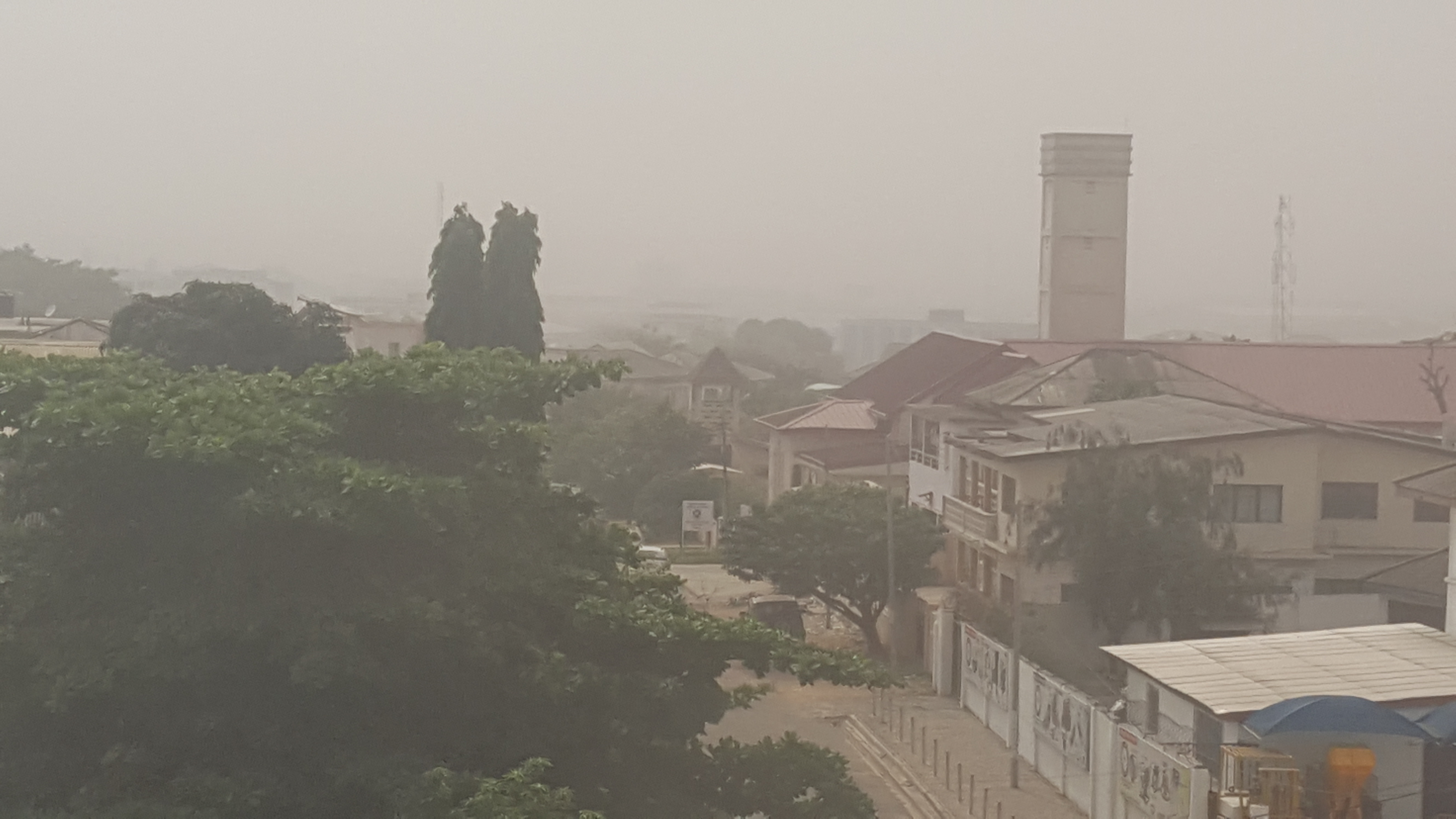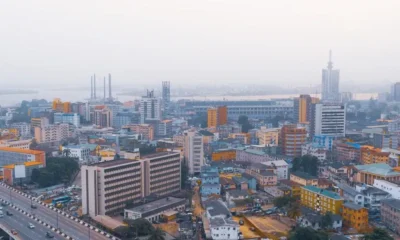NEWS
Expect Intense harmattan in December, January – Nigerian Meteorological Agency (NiMet)
Published
7 years agoon
By
FAB
The Nigerian Meteorological Agency (NiMet) has warned that most parts of Nigeria would experience intense hazy weather conditions otherwise known as harmattan in Dec. 2017 and Jan. 2018.
The Director-General of NiMet, Prof. Sani Mashi, told the News Agency of Nigeria (NAN) on Wednesday in Abuja that the North-eastern part of the country had begun to witness hazy conditions.
Mashi said that the North-easterly wind, one of the two air masses that controlled the country’s climate had begun moving inward from the North-eastern part of the country in the last couple of days.
“Harmattan is definitely going to set in very soon and it has already started setting in the northeastern part of the country.
“The air mass is moving towards the country from northeastern direction, so from December and January it will cover virtually all the country.
“That is why we are predicting that in December and January, there is going to be much
problem of dust and haze in most parts of the country.
“Normally, it last for about 70 days and the effect will be from one condition to another because there are some local conditions that could be modified.
“So you will discover that some locations that are open that do not have hills, there could be local disturbance that would not allow the flow of air in that location.
“And because of that you will discover that air will be flowing and therefore the haze will be more intense.
“But where you have hills that could be disturbing the flow of the northeasterly, it will be modified and the impact of harmattan will be a little bit less compared to other locations,’’ he said.
Mashi explained that while the air mass from the South-western part is moist and facilitated rainfall, the North-easterly air mass is normally dry and dusty thereby giving rise to hazy conditions.
He disclosed that the weather had changed in different parts of the country, saying that atmosphere over most parts were more dry and dusty than being cloudy.
According to him, this situation will continue up till December and January in different parts of the country and it is expected to be more serious in the northern part.
“Normally, there are two major air masses that are controlling the climate of the country.
“There is the air mass that comes from the northeastern part and there is the air mass that comes from the southwestern part of the country.
“The one that comes from the southwestern part of the country is moist and it brings rainfall and then the one that comes from the northeastern part of the country is dry and dusty.
“So, what happen is when you have the south-westerly operating in the Nigeria, you will discover that most part of the country would be covered by rain.
“As soon as it ceases, it will withdraws and then you will see the northeasterly,’’ he said.
NiMet boss said that cessation of rainfall had occurred in many parts of the North, adding that its impact on food production was yet to be ascertained since farmers were yet to give feedback.
He expressed optimism that the impact of early cessation on crop would be minimal considering the early warning from NiMet in its 2017 Seasonal Rainfall Prediction (SRP).
According to him, because of the alert given and early warning, a lot of farmers actually planted crops with early maturity in order to avoid this.
“It has now happened that a number of them have either harvested or about harvesting the crops here,’’ he said.
You may like
-


Here Are The 7 Most Ancient Countries On Earth
-


5 Cheapest States To Live In Nigeria
-


Want To Visit Nigeria? See The Best Time Of The Year!
-


7 Essential Yoruba Phrases You Will Need In Nigeria
-


5 Epic Places In Abuja, Nigeria That’ll Give You Wanderlust
-


They Say “E Go Better”, It’s Getting Worse – Basketmouth On Nigeria’s Economy
BUSINESS
Samsung Galaxy S25 Series Sets The Standard Of AI Phones As A True AI Companion
Published
2 months agoon
January 31, 2025
Samsung Galaxy S25 series sets the standard of AI phones as a true AI companion
…Pioneering the multimodal era with the most context-aware and personalized mobile experience
Lagos, Nigeria – January 23, 2025 – Samsung Electronics Co., Ltd. has announced the Samsung Galaxy S25 series: Galaxy S25 Ultra, Galaxy S25+ and Galaxy S25, setting a new standard as a true AI companion with the most natural and context-aware mobile experiences ever created. Introducing multimodal AI agents, the Galaxy S25 series is the first step in Samsung’s vision to change the way users interact with their phone – and with their world.
A first-of-its-kind customized Snapdragon® 8 Elite Mobile Platform for Galaxy chipset delivers greater on-device processing power for Galaxy AI and superior camera range and control with Galaxy’s next-gen ProVisual Engine.

Galaxy S25 Ultra
With One UI 7, the Galaxy S25 series is a true AI companion that understands the context of your needs and preferences and provides personalized AI experiences with privacy assured at every turn.
It’s the starting point of a shared vision with Google to imagine Android with AI at the core, bringing together developers and partners from around the world.
AI agents with multimodal capabilities enable Galaxy S25 to interpret text, speech, images and videos for interactions that feel natural. Upgrades to Google’s Circle to Search make searching your phone screen more helpful, fast and contextual. Circle to Search now quickly recognizes phone numbers, email and URLs on your screen, letting you call, email or visit a website with a single tap.
With Galaxy S25 series, you can also perform actionable searches with context-aware suggestions for next steps. Plus, Galaxy S25 makes it frictionless to switch between apps for quick follow-up actions, like sharing a GIF or saving event details.
Galaxy S25 represents a breakthrough in natural language understanding, making everyday interactions easier. Simply ask and intuitively find a specific photo in Samsung Gallery or adjust the size of display fonts in Settings.
In the era of AI, personalization goes hand in hand with privacy. On the Galaxy S25, the Personal Data Engine powers personalized AI features by safely analyzing your data on-device to deliver highly tailored experiences that reflect your preferences and usage patterns.
These insights enable tailored experiences, such as using natural language to search for an old photo in the Gallery or being guided through the day with Now Brief, which proactively offers suggestions accessible via Now Bar on the lock screen. Knox Vault keeps all personalized data private and secure.
Combined with enhanced on-device processing capabilities, this creates a powerful, protected AI experience that is unique to Galaxy.

Galaxy S25+
Galaxy’s Most Powerful Performance Ever
The Galaxy S25 series is powered by the Snapdragon® 8 Elite for Galaxy. With unique customizations by Galaxy, this is the most powerful processor ever on the Galaxy S series. Further delivering a performance boost of 40% in NPU, 37% in CPU and 30% in GPU. This is compared to the previous generation.
This power fuels the Galaxy S25 series’ ability to process more AI experiences on-device without compromise, including previously cloud-based AI tasks such as Generative Edit.
10-bit HDR recording is now applied by default, offering four times richer color expression compared to 8-bit. Galaxy S25 can thus capture details in any lighting conditions. Plus, low-light videos have never been clearer than with Galaxy S25.
Based on powerful processor, Galaxy S25 analyzes movement and time to reduce noise more effectively. This integration allows detecting both moving and static objects with greater precision, ensuring sharper, cleaner footage in any scenario.
Galaxy S25 also introduces a range of tools once limited to specialized software, making advanced editing accessible for all. Now anyone can be a pro at editing photos and videos. Audio Eraser simplifies the removal of unwanted noise in videos. By isolating categories of sounds – including voices, music, wind, nature, crowd and noise – you can control what to tone down or eliminate entirely.

Galaxy S25 Series
Durable Design Embracing a More Circular Approach
The Galaxy S25 series builds upon Galaxy’s ‘Essential Design’ grounded in ‘Simple, Impactful and Emotive’ elements.
Galaxy S25 Ultra refines this essence into the slimmest, lightest and most durable Galaxy S series yet. This is with a rounded edge for a comfortable grip that complements the series’ aesthetic identity.
Galaxy S25 Ultra features durable titanium and the new Corning® Gorilla® Armor 2, a first-of-its-kind material that is more durable than glass. It combines Corning’s glass-ceramic with a proprietary anti-reflective surface treatment. This helps to ensure advanced drop protection alongside anti-reflection surface treatment and scratch resistance.
Combined with seven generations of OS upgrades and seven years of security updates, the Galaxy S25 series ensures a reliable and optimized performance over a longer lifespan.
For greater peace of mind, Samsung Care+ offers comprehensive coverage for accidental damage, repairs, and replacements, ensuring peace of mind for Galaxy users.
The Galaxy S25 series is available to order. Galaxy S25 Ultra will be available in Titanium Silverblue, Titanium Black, Titanium Whitesilver and Titanium Gray. Galaxy S25 and Galaxy S25+ will be available in Navy, Silver Shadow, Icyblue and Mint.
For more information about the Galaxy S25 series, please visit: Samsung Newsroom, SamsungMobilePress.com or Samsung.com.
MOVIES
Nollywood Director, Kemi Adetiba Teases King Of Boys 3
Published
3 months agoon
January 9, 2025By
Reporter
Nollywood director Kemi Adetiba has revealed that another instalment of King of Boys will be released on December 25, 2025. She made this announcement on her birthday through an Instagram post.
“KOB Army…. ARISE!!! It’s time…. We MOOOOOOOVE. Signed: Your General. #KOB3 #TheBeginningOfTheEnd #DettyDecember25 #KAV25,” she said.
Earlier in 2023, director Kemi Adetiba commenced pre-production for the next instalment of King of Boys.
Alongside this, she hinted at the upcoming releases of “To Kill A Monkey” and “Welcome to the Fourth.” This new King of Boys instalment, subtitled “The Beginning of the End,” will feature a blend of familiar faces and exciting new characters.
The feature-length film will make its debut in cinemas on December 25, 2025. This groundbreaking series centres around Alhaja Eniola Salami, a powerful businesswoman and philanthropist embroiled in a high-stakes power struggle.
The first film, released in 2018, captivated audiences with its compelling narrative and exceptional performances. Its sequel, “King of Boys: The Return of the King,” premiered on Netflix in 2021.
The original film boasted an ensemble cast, including the formidable Sola Sobowale as Eniola Salami, alongside Nse Ikpe-Etim, Jide Kosoko, Adesua Etomi, and Richard Mofe-Damijo.
READ ALSO: “Everybody Loves Jenifa” Become The Highest Grossing Film of All Time
Kemi Adetiba’s career began as a radio presenter at Rhythm 93.7 FM, where she hosted the popular shows “Soul’d Out” and “Sunday at the Seaside.”
During this time, she anonymously shared her remixes on platforms like Spotify and SoundCloud under the pseudonym “Hule.”
Transitioning to television, Adetiba became a prominent figure on Mnet, producing and hosting popular shows such as “Studio 53” and “Temptation Nigeria” alongside Ikponmwosa Osakioduwa.
She also hosted the Maltina Dance All reality show for three consecutive seasons.
After achieving on-screen success, Adetiba pursued her passion for filmmaking. She enrolled at the New York Film Academy to hone her filmmaking skills.
This decision led to international recognition for her work. Her short film, “Across a Bloodied Ocean,” was showcased at the 2009 Pan African Film Festival and the National Black Arts Festival.
Her directorial debut, “The Wedding Party,” a romantic comedy, premiered on September 8, 2016, as the opening film of the City-to-City Spotlight at the Toronto International Film Festival (TIFF).
MOVIES
“Everybody Loves Jenifa” Becomes Nollywood’s Highest-Grossing Film Of All Time
Published
3 months agoon
January 8, 2025By
Reporter
Nollywood filmmaker Funke Akindele has achieved a historic milestone with her latest film, “Everybody Loves Jenifa.”
The film has officially broken box office records, surpassing the ₦1 billion mark to become the highest-grossing Nollywood movie of all time.
This groundbreaking achievement was announced by FilmOne, the film’s distributor, on their official Instagram page.
“Everybody Loves Jenifa” has officially hit a historic ₦1.466 billion and counting at the box office, making it the highest-grossing film of all time! A massive THANK YOU to our incredible audiences in Nigeria and Ghana for making this dream a reality. Your support is everything. On to even greater heights! Still showing in cinemas near you—experience the magic on the big screen,” the statement read.
Akindele continues her reign as a dominant force in Nollywood with this latest triumph.
“Everybody Loves Jenifa” achieved this remarkable feat in less than two weeks, further solidifying her legacy of box office successes.
Last year, her film “A Tribe Called Judah” made history by becoming the first Nollywood film to surpass the ₦1 billion mark, firmly establishing her as the queen of Nigerian cinema.
In 2023, Akindele’s “Battle on Buka Street” also achieved record-breaking success, surpassing the previous record set by her own blockbuster, “Omo Ghetto: The Saga.”
The “Jenifa” franchise has transcended the realm of a mere movie series, evolving into a cultural phenomenon.
Akindele first introduced the iconic character “Jenifa” to audiences in the 2008 Yoruba-language film “Jenifa,” captivating viewers with her wit and charm.
The character’s popularity skyrocketed with the 2015 launch of “Jenifa’s Diary.” Interestingly, the series is a beloved television series that seamlessly blended humour with valuable life lessons.
With “Everybody Loves Jenifa,” Akindele elevates the character to new heights. She delivers a heartwarming and comedic story that resonates deeply with fans.
The film boasts a stellar ensemble cast, featuring Funke Akindele as Jenifa, Folarin “Falz” Falana as Sege.
Also, Jackie Appiah, Nancy Isime, Stan Nze, Bisola Aiyeola, Patience Ozokwor, Chimezie Imo, and Isaac Olayiwola (Layi Wasabi) brought life to the movie.
Check out more movie updates here.
Latest


Samsung Galaxy S25 Series Sets The Standard Of AI Phones As A True AI Companion
Samsung Galaxy S25 series sets the standard of AI phones as a true AI companion …Pioneering the multimodal era with...


5 Things To Expect In Afrobeats In 2025
Afrobeats is poised to reach unprecedented heights in 2025 as Nigerian music continues its remarkable global ascent. The genre’s explosive...


Here Are The 7 Most Ancient Countries On Earth
The oldest countries in the world stand as remarkable testaments to human civilisation, each containing landscapes and monuments that narrate...


Why Self-Reflection Is More Important Than Resolutions
Millions of people embark on a yearly ritual: they sit down with a notebook and pen, eager to craft a...


Nollywood Director, Kemi Adetiba Teases King Of Boys 3
Nollywood director Kemi Adetiba has revealed that another instalment of King of Boys will be released on December 25, 2025....


John McEnroe Says He Can Be The Commissioner Tennis Needs Amid Doping Crisis
Recent doping controversies involving top players have not damaged tennis’s reputation, but John McEnroe believes that appointing a single commissioner...


“Everybody Loves Jenifa” Becomes Nollywood’s Highest-Grossing Film Of All Time
Nollywood filmmaker Funke Akindele has achieved a historic milestone with her latest film, “Everybody Loves Jenifa.” The film has officially...


FG To Premiere TV Series, “Hidden Riches” On Mining Sector On January 25
Nigeria’s Federal Government will launch an ambitious television drama series focused on the nation’s mining sector, premiering “Hidden Riches” on...


Qing Madi Delivers A Soulful Performance Of “Favourite Pyscho”
Rising Afro-RnB sensation Qing Madi launches into 2025 with a mesmerising performance on the prestigious COLOURS platform, showcasing her latest...


Taiwo Awoniyi’s First Goal Of The Season Seals Nottingham Forest’s Win Over Wolves
Taiwo Awoniyi made a triumphant return to Premier League action. He scored in stoppage time to help Nottingham Forest crush...
-Ad-




